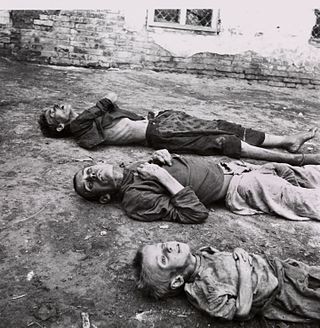
A famine is a widespread scarcity of food caused by several possible factors, including, but not limited to war, natural disasters, crop failure, widespread poverty, an economic catastrophe or government policies. This phenomenon is usually accompanied or followed by regional malnutrition, starvation, epidemic, and increased mortality. Every inhabited continent in the world has experienced a period of famine throughout history. During the 19th and 20th centuries, Southeast and South Asia, as well as Eastern and Central Europe, suffered the greatest number of fatalities due to famine. Deaths caused by famine declined sharply beginning in the 1970s, with numbers falling further since 2000. Since 2010, Africa has been the most affected continent in the world by famine.

A widespread famine affected Ethiopia from 1983 to 1985. The worst famine to hit the country in a century, it affected 7.75 million people and left approximately 300,000 to 1.2 million dead. 2.5 million people were internally displaced whereas 400,000 refugees left Ethiopia. Almost 200,000 children were orphaned.

Northern Bahr el Ghazal(Arabic: ولاية شمال بحر الغزال) is a state in South Sudan. It has an area of 30,543 km2 and is part of the Bahr el Ghazal region. It borders East Darfur in Sudan to the north, Western Bahr el Ghazal to the west and south, and Warrap and the disputed region of Abyei to the east. Aweil is the capital of the state.

The Second Sudanese Civil War was a conflict from 1983 to 2005 between the central Sudanese government and the Sudan People's Liberation Army. It was largely a continuation of the First Sudanese Civil War of 1955 to 1972. Although it originated in southern Sudan, the civil war spread to the Nuba mountains and the Blue Nile. It lasted for almost 22 years and is one of the longest civil wars on record. The war resulted in the independence of South Sudan 6 years after the war ended.

Throughout Russian history famines, droughts and crop failures occurred on the territory of Russia, the Russian Empire and the USSR on more or less regular basis. From the beginning of the 11th to the end of the 16th century, on the territory of Russia for every century there were 8 crop failures, which were repeated every 13 years, sometimes causing prolonged famine in a significant territory. The causes of the famine were different, from natural and economic and political crises; for example, the Great Famine of 1931–1933, colloquially called the Holodomor, the cause of which was, among other factors, the collectivization policy in the USSR, which affected the territory of the Volga region in Russia, Ukraine and Kazakhstan.

The People's Democratic Republic of Ethiopia was a socialist state that existed in Ethiopia and present-day Eritrea from 1987 to 1991.
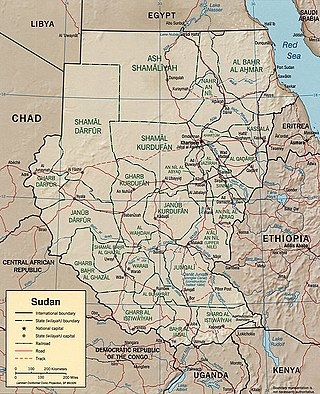
Operation Lifeline Sudan (OLS) was a consortium of United Nations agencies and approximately 35 non-governmental organizations operating in southern Sudan to provide humanitarian assistance throughout war-torn and drought-afflicted regions in the South. Operation Lifeline Sudan was established in April 1989 in response to a devastating war-induced famine and other humanitarian consequences of the Second Sudanese Civil War between the Sudanese government and South Sudanese rebels. It was the result of negotiations between the UN, the Government of Sudan and the Sudan People's Liberation Movement/Army (SPLM/A) to deliver humanitarian assistance to all civilians in need, regardless of their location or political affiliation. This included over 100,000 returnees from Itang in Ethiopia in 1991. Lokichogio was the primary forward operations hub for OLS.

Salva Kiir Mayardit, commonly known as Salva Kiir, is a South Sudanese politician who has been the President of South Sudan since its independence on 9 July 2011. Prior to independence, he was the President of the Government of Southern Sudan, as well as First Vice President of Sudan, from 2005 to 2011. He was named Commander-in-Chief of the Sudan People's Liberation Army (SPLA) in 2005, following the death of John Garang.
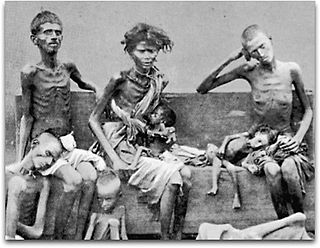
Famine had been a recurrent feature of life in the South Asian subcontinent countries of India and Bangladesh, most notoriously under British rule. Famines in India resulted in millions of deaths over the course of the 18th, 19th, and early 20th centuries. Famines in British India were severe enough to have a substantial impact on the long-term population growth of the country in the 19th and early 20th centuries.
The famine in Sudan in 1998 was a humanitarian disaster caused mainly by human rights abuses, as well as drought and the failure of the international community to react to the famine risk with adequate speed. The worst affected area was Bahr el Ghazal in southwestern Sudan. In this region over 70,000 people died during the famine.
Alexander William Lowndes de Waal, is the executive director of the World Peace Foundation at the Fletcher School of Law and Diplomacy at Tufts University. He is an authority on famine and has worked on the Horn of Africa since the 1980s as a researcher and practitioner. He was listed among Foreign Policy’s 100 most influential international intellectuals in 2008 and Atlantic’s 29 ‘brave thinkers’ in 2009 and is the winner of the Huxley Award of the Royal Anthropological Institute in 2024.

A famine food or poverty food is any inexpensive or readily available food used to nourish people in times of hunger and starvation, whether caused by extreme poverty, such as during economic depression or war, or by natural disasters such as drought.

Pakistan–Sudan relations are the bilateral relations between Pakistan and Sudan. Both countries share the same religion as well as historical baggage of colonial rule. Both countries are members of the Organisation of Islamic Cooperation, Like Minded Group, Non-Aligned Movement and Group of 77. Pakistan has an embassy in Khartoum. Sudan has an embassy in Islamabad.
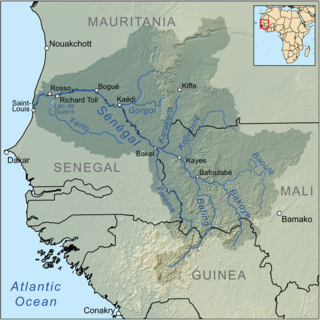
A large-scale, drought-induced famine occurred in Africa's Sahel region and many parts of the neighbouring Sénégal River Area from February to August 2010. It is one of many famines to have hit the region in recent times.
Sudanese refugees are people originating from the country of Sudan, seeking refuge outside the borders of their native country. In recent history, Sudan has been the stage for prolonged conflicts and civil wars, as well as environmental changes, namely desertification. These forces have resulted not only in violence and famine but also the forced migration of large numbers of the Sudanese population, both inside and outside the country's borders. Given the expansive geographic territory of Sudan, and the regional and ethnic tensions and conflicts, much of the forced migration in Sudan has been internal. Yet, these populations are not immune to similar issues that typically accompany refugeedom, including economic hardship and providing themselves and their families with sustenance and basic needs. With the creation of a South Sudanese state, questions surrounding southern Sudanese IDPs may become questions of South Sudanese refugees.

Education in South Sudan is modelled after the educational system of the Republic of Sudan. Primary education consists of eight years, followed by four years of secondary education, and then four years of university instruction; the 8 + 4 + 4 system, in place since 1990. The primary language at all levels is English, as compared to the Republic of Sudan, where the language of instruction is Arabic. There is a severe shortage of English teachers and English-speaking teachers in the scientific and technical fields.

Occurring between July 2011 and mid-2012, a severe drought affected the entire East African region. Said to be "the worst in 60 years", the drought caused a severe food crisis across Somalia, Djibouti, Ethiopia and Kenya that threatened the livelihood of 9.5 million people. Many refugees from southern Somalia fled to neighboring Kenya and Ethiopia, where crowded, unsanitary conditions together with severe malnutrition led to a large number of deaths. Other countries in East Africa, including Sudan, South Sudan and parts of Uganda, were also affected by a food crisis.

In the early months of 2017, parts of South Sudan experienced a famine following several years of instability in the country's food supply caused by war and drought. The famine, largely focused in the northern part of the country, affected an estimated five million people. In May 2017, the famine was officially declared to have weakened to a state of severe food insecurity.
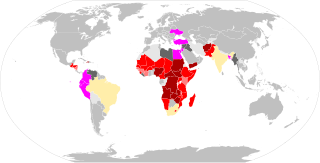
During the COVID-19 pandemic, food insecurity intensified in many places. In the second quarter of 2020, there were multiple warnings of famine later in the year. In an early report, the Nongovernmental Organization (NGO) Oxfam-International talks about "economic devastation" while the lead-author of the UNU-WIDER report compared COVID-19 to a "poverty tsunami". Others talk about "complete destitution", "unprecedented crisis", "natural disaster", "threat of catastrophic global famine". The decision of the WHO on 11 March 2020, to qualify COVID as a pandemic, that is "an epidemic occurring worldwide, or over a very wide area, crossing international boundaries and usually affecting a large number of people" also contributed to building this global-scale disaster narrative.















